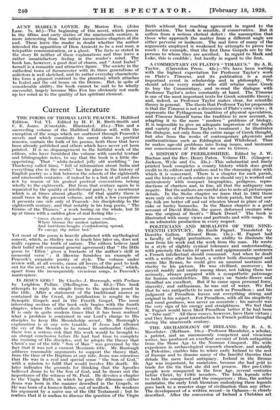Current Literature
THE POEMS OF THOMAS LOVE PEACOCK. Halliford Edition. Vol. VI. Edited by H. F. B. Brett-Smith and C. E. Jones. (Constable. Illustrated. 21s.)—This and a succeeding volume of the Halliford Edition will, with the exception of the songs which are scattered through Peacock's novels and which constitute his surest claim to poetical renown, contain the bulk of his poems, both these that have been already published and others which have never yet been printed. It is no disparagement to the faithful work of the editors, who have furnished the volume with careful textual and bibliographic notes, to say that the book is a little dis- appointing. That " white-headed jolly old worldling " (as Thackeray called him), " full of information about India and everything else in the world," has his place in the history of English poetry as a link between the schools of the eighteenth and nineteenth centuries--if indeed he is a link at all and does not by reason of his genteel poetical conventions belong wholly to the eighteenth. But from that century again he is separated by the quality of intellectual gaiety, by a merriment which is at times almost ghastly. Of that quality there is small trace in the present volume, and with a few exceptions it presents one side only of Peacock—his discipleship to the eighteenth century, and that notably in his long poem, " The Genius of the Thames," a work boring on the whole, but lit up at times with a sudden glow of real feeling like :— " Green shores thy narrow stream confine, Where blooms the modest eglantine,
And hawthorn-boughs o'ershadowing spread, To canopy thy infant bed."
Yet most of the poem is heavily plastered with mythological conceit, which, as Shelley was to teach him later on, does not really express the truth of nature. The editors believe (and their belief will command general agreement) that " the little poem to ' Ellen ' gives a foretaste of the author's skill in memorial verse " ; it likewise furnishes an example of Peacock's exquisite purity of style. The volume under review will, at all events, cause all lovers of the poet to look out for the next, which is to contain " Rhododaphne," which, apart from the incomparably vivacious songs, is Peacock's masterpiece.






































 Previous page
Previous page